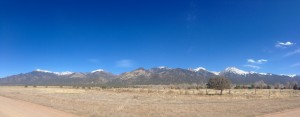There is a certain stillness that settles in the air in this fragment of mountainous desert where I have almost surprisingly found myself for the last three days. In this temporary escape to the Baca campus I have a sense of being contained in some dusty snow globe, mysteriously separate from the familiar. But I am not contained; the sky is vaster, the mountains rise up sharply from the yellow plain to reach broadly upwards. To the south and west, the land extends endlessly. In the midst of these immensities, I am small. I am small and humble in the silence of vastness, captured as I walk slowly against the wind on a dusty road in this singular moment. It is precisely the place to submerge oneself in poetry, in this physical manifestation of the instant-occupying lyric.
We encountered newness not only in geographical location but in the words we studied. As we continued moving forward in time, we met artists of prison cells and protest in writing and music. Wole Soyinka of Nigeria wrote of his imprisonment, both in prose and poetry, in books smuggled to him during his detainment. He described the humiliation of imprisonment as an emotion of dignity in that it creates an environment of solidarity and suggests a previous and consistent uprightness and dedication to a cause or mentality. We explored other poetries of prisons that depicted the struggles of entrapment and brief glimmers of hopefulness. In Robert Johnson, legendary singer of blues, we looked closely at the relationships between white and black music, notably the capitalization of black music by white people and other similar appropriations of black culture for primarily white gain.
The song “Strange Fruit” and a podcast considering it further forced us to examine racism in the northern parts of the United States and how whiteness creates value – the photograph of inspiration for the song is immediately shocking not only because of its explicit interest in two hanging black bodies but also because of the grinning white faces beneath them. “Going to Meet the Man,” the story of a lynching, was disturbing. It incited discussion regarding the sexualization of blackness and the dialectic of simultaneous desire and disgust for other bodies. We considered Bob Dylan and “Hurricane” – both the song and the film – to investigate our perceptions of who can write black poetry.
In light of this, I think I’ve decided that perhaps a definition of black poetry does not exist. It is ambiguous, defined by each moment that chooses to take on blackness and poetry simultaneously. I am humbled and delighted in every instant that I learn and change. I am also humbled by the world that both contains and frees me. I’m not sure that I have Soyinka’s humility – in fact, I’m quite sure that I don’t – but it remains humbling to engage with his dignity.
